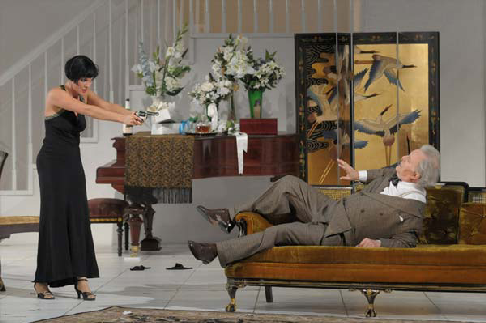25 Nov 2008
Lulu-Palooza in the Windy City
Marlis Petersen, the much lauded "Lulu-du-jour," brought her well-traveled portrayal of Berg's complex heroine to Chicago Lyric Opera and she alone was almost worth the price of admission.

Marlis Petersen, the much lauded "Lulu-du-jour," brought her well-traveled portrayal of Berg's complex heroine to Chicago Lyric Opera and she alone was almost worth the price of admission.
For Ms. Petersen has everything the role requires: gleaming lyric tone, unstrained high notes, first rate musicianship, a thorough understanding of the structure of the doomed girl’s dramatic arc, star presence, a waif-like figure, and truly great gams. So why was I not more emotionally engaged with her very definitive achievement?
Well, for all her consummate professionalism, she seemed to be just on the fringes of the character’s soul. The great director/teacher Charles Nelson Reilly once critiqued an actress thus: “My dear, you are wonderful, but you’re not acting — you’re giving a ‘performance.’” And that in part is what I felt about Ms. Petersen. Wonderful ‘performance,’ yes, but where was the internalized gnawing motivation that informs this creature? In her defense, and to risk musical heresy, I feel that in large part the omission is composer Berg’s.
The text asks us to believe this woman is irresistible, a charismatic being that inspires unhealthy sexual obsession in all who cross her path. I was not yet convinced this night that the intent of the tale is borne out by its musicalization. The heroine’s churning prosaic declamation, the oft-angular leaps, the quirky melismas that sound like “Lucia” on a bender, the pitches in extremis where only dogs can hear — all these make me admire the technique and the intellect to be sure, but do not engage my emotions. Or my libido.
Perhaps a uniquely gifted stage creature like Natalie Dessay could truly inhabit this role and make the dramatic work. Until then, Ms. Petersen’s very real achievement will likely nevertheless give much pleasure to many fans of this troubling piece. Not that hers was the evening’s only success.
The talented and versatile William Burden was simply the best Alwa of my experience. Is there anything at which this accomplished tenor does not excel? Here he sang with his customary easy precision, and spun out some achingly beautiful phrases. His duet with the heroine was arguably the highpoint of the evening. Dramatically committed, pristine tone and technique, handsome presence, Mr. Burden delivered on all counts.
The much anticipated Lyric debut by Wolfgang Schoene, a notable Dr. Shoen, was impressively musical and secure of characterization. His rather straight vocal production certainly filled the large house, although I found it a little on the dry side. Still, nothing about the part escapes him and he was often thrilling and ultimately (as Jack) chilling. Thomas Hammons’s booming, orotund Schigolch was more to my vocal taste and he made the most of his stage time. The rich, ringing contralto-ish Countess Geschwitz from Jill Grove was also top drawer, and she had good fun with parts of the role, running around in the bustle of Act II like Estelle Parsons chasing the getaway car in Bonnie and Clyde.
 Marlis Petersen (title role) and Wolfgang Schöne (Dr. Schön) in Lyric Opera of Chicago’s new production of Lulu, directed by Paul Curran for the 2008-09 season. Photo by Dan Rest/Lyric Opera of Chicago
Marlis Petersen (title role) and Wolfgang Schöne (Dr. Schön) in Lyric Opera of Chicago’s new production of Lulu, directed by Paul Curran for the 2008-09 season. Photo by Dan Rest/Lyric Opera of Chicago
The many featured roles were well taken by Lyric’s outstanding young artists, with Scott Ramsay’s Painter deserving special mention for his gleaming delivery. Only Jan Buchwald seemed not quite in the same league as this stellar group of soloists, with a fairly woolly and diffuse Animal Tamer. While he sang much more clearly as the Athlete, Mr. Buchwald suggested more an East Bloc WWF act than the usual trim track star.
Stage director Paul Curran managed his skilled cast with excellent results, combining meaningful groupings and well motivated blocking with often inspired stage business. He also successfully mined all the humor in the piece which greatly heightened the catastrophic outcome. Kevin Knight’s effective set design pulled off the trick of using a white-box-as-unit-environment without parodying the dreadful cliche’s of 1980’s German opera design. This handsomely detailed space was changeably adorned with well chosen dressing, and subsequently opened up at the back to reveal a beautiful multi-leveled staircase. Mr. Knight also provided the characterful costumes.
If anything, I felt the white set was perhaps too clean, too bright, too open for the dark undercurrents of the story. But I grouse. The overall look of the design was a fine artistic achievement, especially paired with the spot-on (as it were) projections and film work contributed by John Boesche, and as meaningfully lit by David Jacques. First rate all.
In the pit, Sir Andrew Davis drew exceptional playing from this fine band, and made as cogent a case as I think possible for Berg’s opus. The occasional volume imbalances between orchestra and stage are seemingly unavoidable, given the thick brass voicings at some key junctures. The highly affecting, personalized solo instrumental work was equaled by superlative ensemble playing.
I cannot imagine a better case being made for this complex, challenging piece of musical theater. Still, after four different (good) productions to date, and many earnest “listens,” I frankly still don’t respond to the score. My limitation, I know. That I am not alone was evidenced by a trickle of audience leaving at the first intermission, augmented by a stream of departees after Act II.
At the end of the day, then, I have to say I found myself totally loving most everyone and everything about Lyric Opera’s admirable Lulu except…it.
James Sohre